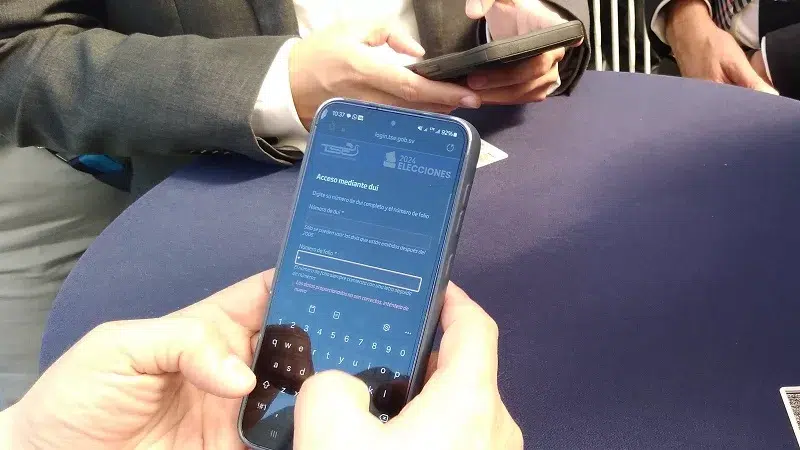Magistrate Noel Orellana of the Supreme Electoral Tribunal (TSE) reported that more than 120,634 Salvadorans abroad cast their vote in the presidential election via the Internet, which has a 30-day deadline, counted from last January 6, to take place.
Internet voting is enabled for the election of the President and Vice President, which records 120,634 votes cast as of 11:00 pm last Tuesday, and for the election of deputies to the Legislative Assembly, 107,872 votes were cast.
“In other words, for the President 16.2% and for deputies to the Assembly 14.5%” said the magistrate in the interview of the Entrevista con Diana Verónica y Tony program this Wednesday.
The total electoral roll closed with 6,214,399 voters, of whom 5,473,305 are on the national register and there are 741,094 people with DUI with an address abroad, who are the ones casting their votes via the Internet.
“The vote they are casting at the moment for the election of deputies to the Legislative Assembly is intended for the election of the deputies of the constituency or department of San Salvador” – Noel Orellana, TSE magistrate
Internet voting is one of the modalities established in the Special Law for the Exercise of Suffrage from Abroad, the other is the modality of electronic presence voting, which will be held only on the day of the February 4 elections for those who have an address within the national territory in their current or expired DUI.
Voting with a valid or expired passport will also be allowed in presence electronic voting only on February 4th. And these votes will also be for the department of San Salvador.
“That is to say, electorally speaking, the votes that deputies elected for the department of San Salvador will need will be relatively high,” said Orellana.
He considered that with the reform of the Electoral Code, the figure of residues for the allocation of seats is terminated.
As for the formation of the Overseas Vote Receiving Boards (JRVEX), the TSE indicated that not all the people proposed by the parties met the requirements, and the TSE is looking for a way to form them.
“The TSE of the electoral registry selects people to form the boards. We are having problems that we do not have enough time to train these people,” he added.
For the vote from abroad, the special law required the TSE to hire a company to implement the technological system, which was the INDRA company; while the company contracted for the audit of the electoral register abroad and the implementation of the technology is the U.S. firm CGTS.
TSE registra más de 120,634 votos emitidos por la vía de Internet
El magistrado Noel Orellana, del Tribunal Supremo Electoral (TSE), informó que más de 120,634 salvadoreños en el extranjero emitieron su voto en la elección Presidencial por medio de la modalidad de Internet, la cual cuenta con un plazo de 30 días, contados desde el pasado 6 de enero, para poder efectuarse.
El voto por Internet está habilitado para la elección a la Presidencia y Vicepresidencia, que registra 120,634 votos emitidos hasta las 11:00 de la noche del pasado martes, y para la elección de diputaciones a la Asamblea Legislativa se registraron 107,872 votos emitidos.
“Es decir, en el caso de Presidente 16.2% y en el caso de diputados a la Asamblea 14.5%”, dijo el magistrado en la entrevista del programa de Entrevista con Diana Verónica y Tony de este miércoles.
El padrón electoral total cerró con 6,214,399 electores, de ellos 5,473,305 es el padrón nacional y hay 741,094 personas con DUI con dirección en el extranjero, quienes son los que están emitiendo el voto vía Internet.
“El voto que ellos están emitiendo en este momento para la elección de diputados a la Asamblea Legislativa ese voto viene destinado para la elección de los diputados de la circunscripción o departamento de San Salvador” — Noel Orellana, magistrado del TSE
El voto por Internet es una de las modalidades establecidas en la Ley Especial para el Ejercicio del Sufragio desde el Extranjero, la otra es la modalidad de voto electrónico presencial, la cual se realizará solo el día de las elecciones del 4 de febrero para quienes tienen en su DUI, vigente o vencido, la dirección dentro del territorio nacional.
También se permitirá que voten con pasaporte, vigente o vencido, en el voto electrónico presencial solo el 4 de febrero. Y estos votos serán también para el departamento de San Salvador.
“Es decir, electoralmente hablando, los votos que van a necesitar los diputados que salgan electos para el departamento de San Salvador van a ser relativamente alto”, expresó Orellana.
Consideró que con la reforma al Código Electoral se termina la figura de residuos para la asignación de escaños.
En cuanto a la conformación de las Juntas Receptoras de Votos del Exterior (JRVEX), el TSE indicó que no todas las personas propuestas por los partidos cumplían con los requisitos y el TSE está buscando cómo conformarlas.
“El TSE del registro electoral selecciona personas para que conformen las juntas. Estamos teniendo problemas que no tenemos el tiempo suficiente para capacitar a estas personas”, añadió.
Para el voto desde el exterior la ley especial obligó al TSE a contratar una empresa para que implemente el sistema tecnológico, que fue la empresa INDRA; mientras que la empresa que se contrató para la auditoría del registro electoral del exterior y de la implementación de la tecnología es la firma estadounidense CGTS.

